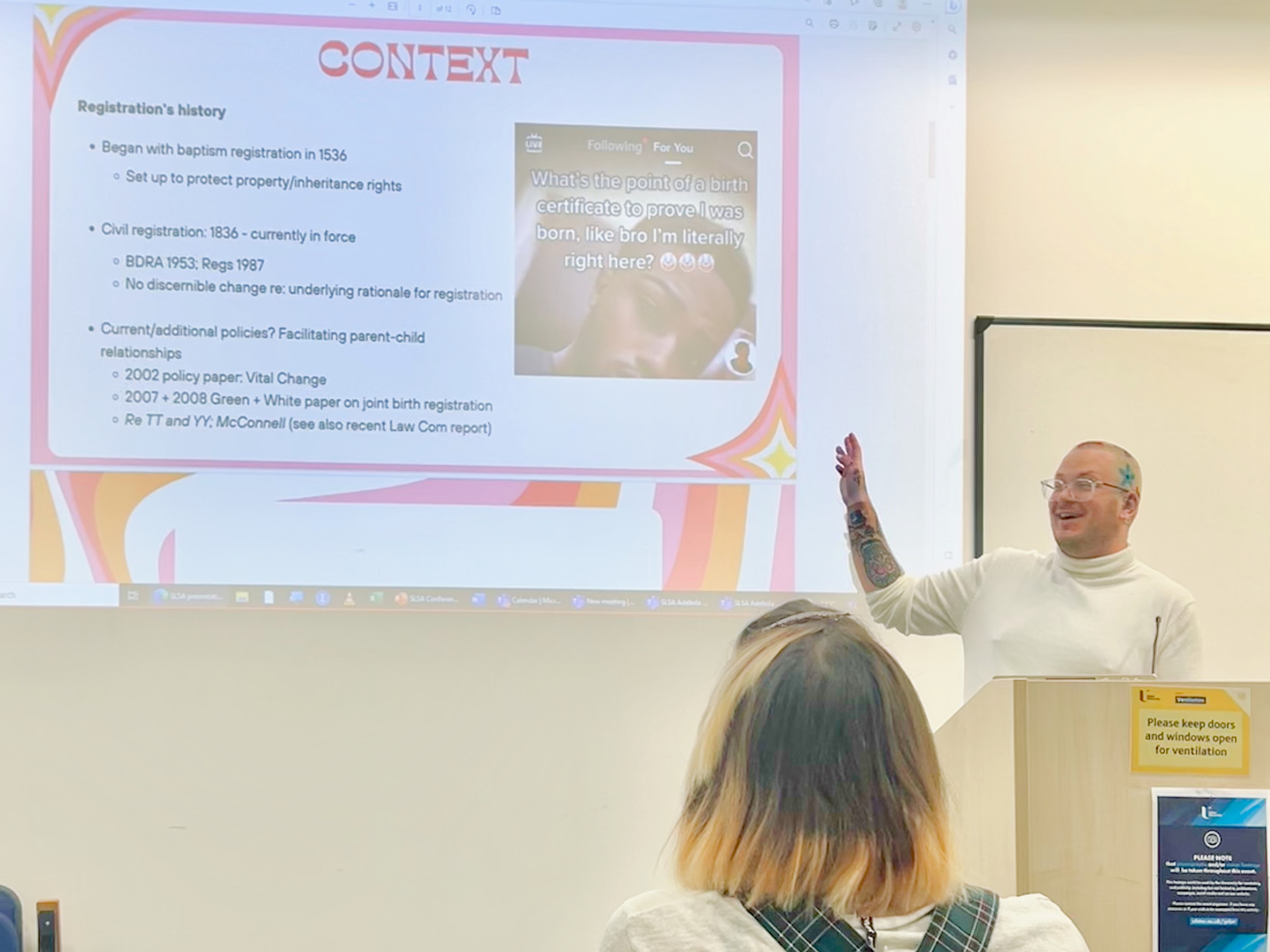I realised I wasn’t that interested in practising law in the courtroom, but rather critiquing law. This is what led me to academia.
Could you tell us about your studies since graduating with your undergraduate degree from Kent?
I completed my Master’s at Kent too, in Medical Law and Ethics with Human Rights Law. Before starting, I realised my main legal interests lie broadly within medical and family law after studying them both at undergraduate level. The units offered on the Kent LLM – and the fact I was able to have a ‘major’ and ‘minor’ element to the degree – were both massive selling points. I was also able to include my knowledge of family law within some of the medical law units offered, and my dissertation was essentially a hybrid of the two areas looking at the law’s understanding of the ‘family’. I am also currently completing my PhD researching queer families and birth registration.
Tell us about your current work.
I am currently a PhD candidate at the University of Bristol, having started my studies in 2020 and will also be a Teaching Associate while finishing my PhD. A Teaching Associate is basically a ‘mini-lecturer’ (that’s how I understand it!) and is a massive step from the hourly-paid teaching I am used to, and which I did throughout my second and third years. I will currently be teaching Tort Law and Child Law units, meaning it was invaluable to have studied these at undergraduate level already. My post-PhD goal is to pursue further research and teaching opportunities.
Can you tell us about other jobs you have had and how they helped you?
I had a full-time job in-between my Master’s and the PhD as a Research Assistant at the Law Commission of England and Wales. For various reasons, this is viewed as a prestigious role within the field of law and showcases that, among other things, candidates are able to research complex areas of law with high levels of skill, and can write cogently and persuasively. These are essential attributes when completing a PhD.
How did your time at KLS contributed to your career trajectory?
My time at Kent Law School contributed massively to my career trajectory. It is one of few critical law schools in the UK (this was a massive selling point in deciding where to study back in 2015!) and I have truly taken its teachings with me throughout my career so far – and always will. I consider myself to be a critical scholar who refuses to take law at face value. It was through taking units such as: Race, Religion and Law; Gender, Sexuality and Law; Family Law; and Law and Medical Ethics at undergraduate level which made me enjoy approaching law this way, and why I continue to do so. It also opened the door to becoming more acquainted with various theoretical perspectives on law, such as feminist and queer/trans theory.
The teaching and support from the staff there were fantastic and I keep in touch with them. During my Master’s, I remember talking to Dr Kirsty Horsey (soon to be Professor and my two-time dissertation supervisor) who told me that I was surely considering a PhD, and I was adamant I wasn’t…
Do you have any advice for anyone considering studying law and wondering what sort of career they could have after graduation?
It’s simple, but I would just say to go for it! It’s challenging at times, but really rewarding. Just be sure, like with any degree, that you are genuinely interested in the subject – although this doesn’t mean you have to enjoy every unit you take (and some are compulsory!).
As for potential future careers: the possibilities really are endless. I would stress that there is absolutely no need to go into law after completing a law degree, be that in a practicing sense or an academic sense. Any degree can open countless doors for you. Take the time to decide what it is you want to do.
Don’t be afraid to change your career trajectory. I started university being absolutely convinced I would be a criminal barrister. I think mostly because that’s what you see portrayed on TV (and because I was committed to a sense of ‘justice’, but am now more sceptical of what ‘justice’ means and how it can be achieved). I then studied criminal law and realised I didn’t enjoy it as much as I thought I would, but loved family and medical law so thought I would specialise in those areas. But I had a realisation during my Master’s that actually I wasn’t that interested in practising law in the courtroom, but rather critiquing law as much as possible and essentially doing my own thing (which you can’t always do as much as you’d like in court). This is what led me to academia.

